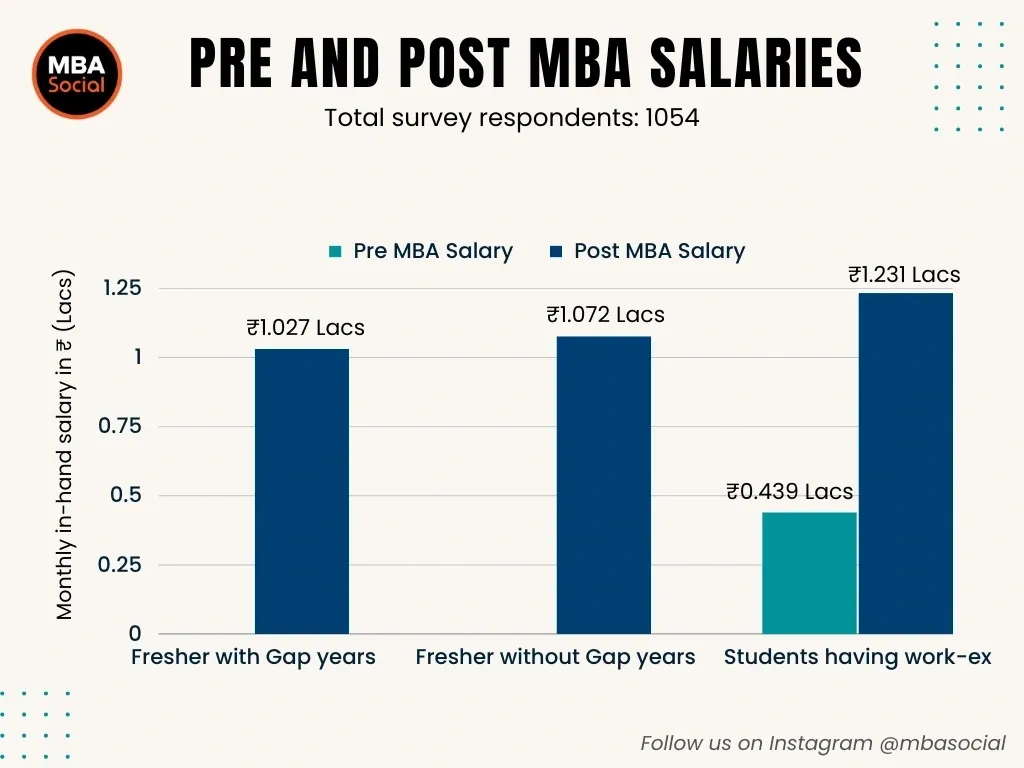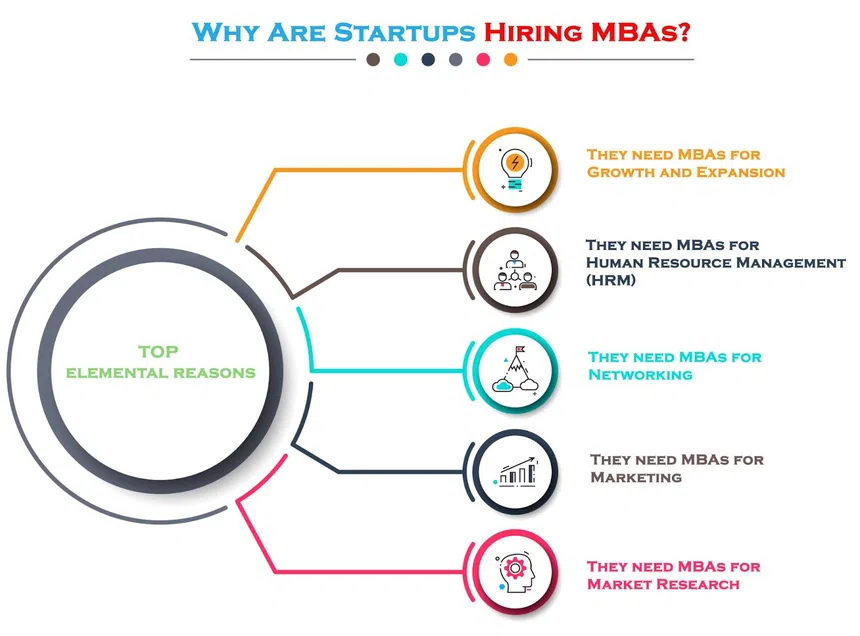MBA Salary in India in 2025 [For Freshers & Experienced Professionals]
Table of Contents
![MBA Salary in India in 2024 [For Freshers & Experienced Professionals]](https://jaro-website.s3.ap-south-1.amazonaws.com/2024/07/MBA-Salary-in-India-in-2024-For-Freshers-Experienced-Professionals.jpg)
- jaro education
- 15, July 2024
- 1:00 pm
In today’s job market, many job listings specify ‘MBA preferred,’ a trend that has been steadily increasing over the past five years. This preference shows MBAs’ valuable skills and abilities, especially in logical thinking and problem-solving. An MBA salary in India is directly linked to their qualifications and experience. With the right credentials, you can secure a competitive MBA salary in India.
The Master of Business Administration (MBA) is a respected academic program designed to provide a broad understanding of business strategies and management principles. It is popular among both undergraduate and postgraduate students and covers essential areas such as finance, marketing, operations, and entrepreneurship.
As per Custom Market Insights, the global MBA education market is expected to reach USD 83.08 billion by 2032, showing the continued demand for MBA degrees. Employers highly value MBAs for their ability to handle complex business challenges in roles like executive positions, consulting, investment banking, and management. The MBA scope and salary in India continue to grow, making it a sought-after degree for those aiming for high-paying roles in finance, consulting, and management. This ongoing demand highlights the significant impact an MBA can have on career advancement and salary potential, especially in a competitive market like India.

*MBASocial
So, if you’re considering pursuing an MBA and want to know about the top salary trends in the MBA salary in India, you’ve reached the right place! This blog explains how an MBA can increase your salary and earning potential by enhancing your knowledge, sharpening your critical thinking skills, and boosting your credibility, and also gives you useful insights on everything right from the minimum salary of MBA in India to the highest.
Factors that Affect MBA Salary in India
When considering the factors that affect MBA salary in India, several key elements come into play:
Work Experience
One of the most significant factors influencing MBA salary in India is prior work experience. Candidates who enter MBA programs with previous work experience tend to be more attractive to employers. This is because they bring practical knowledge and skills that can be immediately applied to their new roles. During placements, experienced candidates often receive higher salary offers compared to their non-experienced peers. This disparity is due to the value employers place on the ability to adapt quickly and contribute effectively from day one.
MBA Specialization
The specialization chosen during an MBA program greatly impacts the prospects of an MBA salary in India. Different specializations align with varying industry demands and pay scales. Common MBA specializations with highest MBA salary in India are as shown below:
- Sales and Marketing: Focuses on market strategies, consumer behavior, and sales techniques.
- Consulting: Prepares students for advisory roles, problem-solving, and strategic planning.
- Human Resources: Emphasizes personnel management, organizational behavior, and labor relations.
- Finance: Covers financial analysis, investment management, and corporate finance. This specialization often yields the highest salary offers, as finance roles are critical and demand a high level of expertise.
- Operations and International Business: Deals with supply chain management, logistics, and global business strategies.
- IT and Systems: Focuses on information technology management and system integration.
Historically, individuals specializing in Finance receive the highest Cost to Company (CTC) offers, which translates to the highest MBA salary in India, due to the lucrative nature of financial roles and the specialized skills required.

*MBAStudyAbroad
MBA Colleges
The reputation and ranking of the MBA institution play a crucial role in determining salary outcomes. Prestigious colleges, such as the Indian Institutes of Management (IIMs), are known for their rigorous academic programs, distinguished faculty, and extensive alumni networks. MBAs from top-tier institutions like the IIMs typically command a higher average MBA salary in India, ranging from INR 30 LPA to INR 100 LPA. The brand value of these institutions enhances employability and attracts top recruiters, leading to a better MBA salary in India for their students.
MBA Salary in India based on Specialization
One frequently asked question online is: What is the monthly MBA salary in India? On average, MBA holders in India earn between ₹90,000 and ₹100,000 per month, translating to an annual salary of approximately ₹7.71 lakhs.
Let’s explore how MBA salary in India varies across different specialization streams.
MBA in Finance
After completing an MBA in Finance, individuals can pursue career opportunities across a diverse range of sectors. These sectors not only offer promising job roles but also provide avenues for substantial career growth and this stream is responsible for offering the highest MBA salary in India. Here are some key sectors where MBA in Finance students can find employment:
- Banking and Financial Services
- Investment Banking: Roles in investment banking involve working on mergers and acquisitions, raising capital, and providing strategic advisory services to clients.
- Commercial Banking: Opportunities in commercial banking include positions such as loan officers, credit analysts, and branch managers, where professionals help businesses and individuals manage their finances.
- Asset Management: Professionals in asset management oversee investment portfolios for individuals and institutions, aiming to maximize returns and manage risks.
- Private Equity and Venture Capital: These roles involve investing in and managing companies, often startups or growing businesses, with a focus on generating significant returns.
- Corporate Finance
- Financial Planning and Analysis (FP&A): FP&A professionals work within corporations to analyze financial data, create budgets, and develop strategies to ensure financial health.
- Treasury: Treasury roles involve managing the company’s liquidity, investments, and risk related to financial activities.
- Internal Audit and Compliance: These positions ensure that a company’s financial operations comply with regulatory requirements and internal policies.
- Consulting
- Financial Consulting: Financial consultants provide advice to businesses and individuals on financial planning, investment strategies, and risk management.
- Management Consulting: Management consultants with a finance specialization help organizations improve their financial performance through strategic planning and operational improvements.
- Insurance
- Actuarial Science: Actuaries use mathematical and statistical methods to assess risk and determine insurance premiums.
- Risk Management: Risk managers identify, assess, and mitigate financial risks for insurance companies and their clients.
MBA Salary in India for a Finance Specialization
| Job Title | Average Salary (per year) |
|---|---|
| Financial Analyst | 6,12,500 |
| Finance Manager | 14,70,000 |
| Senior Financial Analyst | 11,00,000 |
| Senior Business Analyst | 14,00,000 |
| Project Manager (Unspecified Type) | 18,70,000 |
| Operations Manager | 12,00,000 |
| Data Analyst | 7,00,000 |
MBA in Business Analytics
Individuals with an MBA in Business Analytics degree have diverse career opportunities to earn a great MBA salary in India across several industries, including Information Technology, Healthcare, Financial Services, and E-Commerce. The MBA in data analytics salary, and the MBA IT salary in India are known to be rewarding.
With the rising significance of data analytics in the business world, the average salary of MBA graduates in India for a specialization in business analytics in India is between INR 7 lakhs and INR 12 lakhs per year. Experienced professionals can earn up to INR 20 lakhs or more.
MBA Salary in India for a Business Analytics Specialization
| Job Title | Average Salary (per year) |
|---|---|
| Analytics Consultant | 15,00,000 |
| Business Analyst (Unspecified Type) | 8,00,000 |
| Senior Business Analyst | 13,00,000 |
| Data Analyst | 7,00,000 |
| Data Scientist | 12,30,000 |
| Branch Sales Manager | 7,00,000 |
MBA Marketing
After completing an MBA in Marketing Management, MBAs can pursue a wide range of career opportunities across multiple sectors, including but not limited to the following:
- Consumer Goods and Retail: Marketing managers in this sector are responsible for developing strategies to promote products, enhancing brand awareness, and driving sales growth. Roles include brand manager, product manager, and retail marketing coordinator.
- Advertising and Public Relations: This sector involves creating and managing advertising campaigns, handling public relations activities, and crafting compelling marketing messages. Common roles include advertising executive, public relations manager, and media planner.
- Digital Marketing and E-Commerce: With the rise of online shopping and digital advertising, there is a high demand for professionals skilled in SEO, SEM, content marketing, social media marketing, and online brand management. Positions include digital marketing manager, SEO specialist, and e-commerce strategist.
- Banking and Financial Services: Marketing managers in this field focus on promoting financial products and services, enhancing customer engagement, and managing customer relationships. Jobs in this sector include marketing analyst, financial product manager, and customer relationship manager.
- Healthcare and Pharmaceuticals: This sector requires marketing professionals to develop strategies for promoting healthcare services, pharmaceutical products, and medical devices. Roles include healthcare marketing manager, pharmaceutical sales manager, and medical marketing specialist.
- Technology and IT Services: Marketing managers in the technology sector work on positioning tech products and services, managing product launches, and creating technology-focused marketing campaigns. Positions include product marketing manager, technology evangelist, and IT services marketing manager.
- Telecommunications: Marketing professionals in this sector work on promoting telecom services, managing customer relationships, and developing competitive marketing strategies. Roles include telecom marketing manager, customer acquisition specialist, and product manager for telecom services.
MBA Salary in India for a Marketing Specialization
| Job Title | Average Salary (per year) |
|---|---|
| Marketing Manager | 12,00,000 |
| Business Development Manager | 7,00,000 |
| Senior Marketing Manager | 17,10,000 |
| Regional Sales Manager | 14,30,000 |
| Marketing Executive | 3,00,000 |
| Digital Marketing Manager | 9,00,000 |
MBA in Human Resource Management
The role of HR professionals has become increasingly prominent across various sectors. As a result, those specializing in HR Management are in high demand and can secure positions in IT companies, law firms, advertising agencies, retail corporations, media organizations, newspapers, and more.
The MBA salary in India for a Human Resources Management professional can vary depending on the role and experience, but can range from INR 2,50,000 to INR 18.6 LPA.
MBA Salary in India for a HR Management Specialization
| Job Title | Average Salary in LPA (INR) |
|---|---|
| Senior HR Manager | 12,00,000 |
| Head HR Manager | 7,92,000 |
| Vice President of HR | 42,70,000 |
| Chief HR Manager | 18,00,000 |
MBA in Operation Management
MBAs specializing in Operations Management often secure positions in various sectors and achieve an amazing MBA salary in India such as:
- Retail: Careers in retail management involve store management, merchandising, marketing, and operational roles within retail stores or chains. MBAs are thus well-equipped for their management and strategic decision-making responsibilities.
- Logistics: Opportunities in logistics include supply chain management, transportation, warehouse operations, inventory control, and distribution. Salaries for MBA holders in logistics are attractive due to the dynamic nature of the field.
- Manufacturing: MBAs worli in manufacturing industries oversee production processes, quality control, operations management, or supply chain roles within factories or production units. They earn competitive salaries by optimizing production processes and supply chains.
- Management Consulting: MBAs work as consultants offering strategic advice, market analysis, process optimization, and management solutions across industries. They earn well by providing cost-effective solutions and strategic advice.
- Information Technology: In IT, roles may include project management, IT consulting, software development, business analysis, and technology services. MBA professionals in IT leverage their project management skills to drive technological innovation and earn competitive salaries.
- Construction: Careers in construction include project management, site supervision, construction planning, and operations management in building and infrastructure sectors. Efficient management and the right MBA specialization attract lucrative salaries.
- Financial Institutions: Opportunities in financial institutions involve roles in banking, investment management, financial analysis, risk assessment, or corporate finance. Salaries are competitive due to the required skills in financial analysis and risk management.
- Hospitality: In the hospitality sector, individuals may pursue careers in hotel management, event planning, restaurant management, or tourism services. The industry’s growth offers ample opportunities for well-paying jobs.
- Transportation: Roles in transportation management encompass managing transportation networks, logistics planning, fleet management, and operations in airlines, railways, shipping companies, or logistics firms. Salaries are appealing due to the oversight of logistics and transportation operations.
MBA Salary in India for a HR Management Specialization
| Job Title | Salary (INR) |
|---|---|
| Project Manager | 18,70,000 |
| Operations Manager | 12,00,000 |
| Business Analyst, IT | 9,00,000 |
| Supply Chain Manager | 16,50,000 |
| SAP Consultant | 7,00,000 |
| Purchasing Manager | 11,30,000 |
MBA Salary in India - IIMs and Top B-Schools
The placement process for MBA/PGP/PGDM programs at IIMs is structured into three key sessions: summer placements, lateral placements, and final placements. In 2024, these sessions saw robust participation from a diverse array of multinational and national companies across different sectors, all keen on recruiting highly skilled MBAs from various IIM campuses. Major recruiters included renowned names such as ICICI Bank, Infosys, Wipro, Google, EY, Intel, Tech Mahindra, American Express, Amazon, IBM, Microsoft, Deloitte, Reliance, Adani, and TATA Steel, among numerous others.
The MBA scope and salary in India are highly promising, with opportunities across various industries offering lucrative compensation, especially for those graduating from top-tier business schools. Here is the list that provides the MBA salary in India after passing out from different IIMs.
| IIM Name | Highest Salary (Rs. LPA) | Average Salary (Rs. LPA) |
|---|---|---|
| IIM Ahmedabad | 100.46 | 34.45 |
| IIM Bangalore | 100 | 35.3 |
| IIM Calcutta | 100.15 | 35.07 |
| IIM Lucknow | 65 | 30 |
| IIM Kozhikode | 67.02 | 31.02 |
| IIM Indore | 100.14 | 30.21 |
| IIM Shillong | 71.3 | 26.96 |
| IIM Rohtak | 36 | 18.73 |
| IIM Ranchi | 67 | 35.5 |
| IIM Raipur | 43.43 | 21.04 |
| IIM Trichy | 41.61 | 20.55 |
| IIM Kashipur | 37 | 18.1 |
| IIM Udaipur | 35.04 | 20.02 |
| IIM Nagpur | 64 | 16.74 |
| IIM Visakhapatnam | 43 | 16.61 |
| IIM Bodh Gaya | 48.58 | 14.96 |
| IIM Amritsar | 36.25 | 16.51 |
| IIM Sirmaur | 64.12 | 14.45 |
| IIM Sambalpur | 64.61 | 16.74 |
| IIM Mumbai | 54 | 47.29 |
| IIM Jammu | 64 | 16.43 |
*bschool.careers360.com
Why Startups Are Increasingly Bringing MBAs On Board
In recent times, startups have shown a growing preference for hiring MBAs. The average salary of MBA graduates in India is also significantly higher as compared to other PG degrees. Here are the key factors driving this trend:
- Strategic Problem-Solving: MBAs are renowned for their rigorous training in critical thinking and strategic planning. Startups often encounter intricate challenges that demand a methodical approach. MBAs contribute these skills, aiding startups in navigating uncertainties and making well-informed decisions.
- Business Expertise: Startups require individuals capable of swiftly grasping financial intricacies and executing prudent financial decisions. MBAs undergo extensive training in finance, accounting, and economics, enabling them to assist startups in resource management and data-driven financial planning.
- Networking Potential: Many MBA programs offer robust networking platforms. Startups can leverage these connections to access potential investors, advisors, mentors, and collaborators. MBAs frequently possess ties to venture capitalists and angel investors, facilitating crucial funding opportunities for startups.
- Market Insight and Analysis: Understanding market dynamics and consumer behavior is pivotal for startup success. MBAs are adept at conducting market research, analyzing industry trends, and identifying avenues for growth. This expertise empowers startups to refine their business strategies and enhance market positioning effectively.
- Leadership and Team Management: The role of effective leadership cannot be overstated in fostering the success of startups. MBA programs dedicate significant attention to training in leadership and team management, crucial for guiding diverse teams within the dynamic and high-paced startup ecosystem.
- Innovation and Entrepreneurship: Modern MBA curricula increasingly include specialized courses tailored to entrepreneurship and innovation. These programs are designed to instill in MBAs the necessary mindset and practical tools required to initiate, oversee, and expand new ventures. Such skills are particularly aligned with the strategic objectives of startups aiming for growth and market disruption.
- Access to Resources: MBA programs offer invaluable access to extensive resources such as libraries, research databases, and other academic tools. These resources prove immensely beneficial for startups engaged in activities like market analysis, competitive assessment, and business plan development. Such access can significantly enhance the strategic planning and operational capabilities of emerging businesses.

*Khatabook
Conclusion
With international businesses flocking to India due to its vast consumer base, the demand for MBAs to lead and manage various business functions is on the rise. If you find the benefits of an MBA relevant to your career goals and find the average MBA salary in India to be close to what you would desire, pursuing this degree could be a smart move.
While the MBA salary in India figures mentioned in this article are approximate (based on recent Glassdoor figures) and not guaranteed, remember that your actual earnings will depend on your skills, experience, expertise, and ability to contribute to an organization’s growth. Ultimately, an MBA can significantly enhance your career prospects and earning potential in the dynamic business landscape of India.










